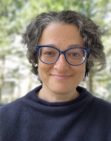This podcast is the story of one small moment in a small town: at a Black Lives Matter vigil outside a Chapel Hill church in July 2020, a young Black woman was physically attacked by a white man walking by. She did not sustain serious physical injuries, and the attacker was arrested and charged. But despite the obvious racism of this attack, it took a sustained community effort to get him charged with North Carolina’s equivalent of a “hate crime,” because the state law is so narrow and weak, a fact which the young woman tried to fight, along with her state representatives.
So this is also a larger story, of a legal blind spot with human consequences, and what it takes to remain constantly visible in the fight for racial justice. Changing the letter of the law cannot do all the work of dismantling systemic racism, of course, but this project taught me that when the law becomes a site of “gaslighting” for communities that are oppressed, in small and large ways, the absence of that robust legislation does real harm.
As a historian of American religion by trade, I also see in this moment many reverberations of past acts of racial violence in the town where I live. It was impossible to talk about hate crimes and Chapel Hill, for example, without mentioning the horrific 2015 murders of three Muslim students, Deah Barakat, Yusor Abu-Salha and Razan Abu-Salha, which were not prosecuted as hate crimes.[1] Or the 1970 murder of James Cates by white supremacists on the nearby University of North Carolina campus, a tragedy that in 2022 finally received a memorial, thanks in part to the dedicated efforts of Cates’s cousin, Congresswoman Valerie Foushee.[2] The story of a young Black woman being beaten on the street even called to my mind the much older story of Julian Carr, who, in dedicating UNC’s Confederate monument in 1913, reminisced fondly about having “horse-whipped” a young Black woman who had “insulted and maligned a Southern lady…upon the streets of this quiet village.”[3] That monument was famously torn down by student protestors in August 2018; who then had to fight to keep the university from paying the Sons of Confederate Veterans to take it off their hands.[4]
The fact that Chapel Hill, mostly known as an idyllic university town, a large “blue dot” in a contested state, has this history of horrific hate crimes so close to the surface makes it not at all unique in the United States; indeed, it makes it typical, in a nation which has yet to fully reckon with its history of racial violence. Chapel Hill is certainly trying to do just that. In the course of researching this story, I learned that Chapel Hill’s mayor, as well as both its state-level representatives and state senators, lawyers, judges, ministers and community members all rallied around Kalkidan Miller and the Hate Crimes Prevention Act.
Such an outpouring of effort might seem futile in a political climate where no legislation can pass without overwhelming Republican support, and moreover in a political climate which a Hate Crimes Prevention Bill would never have that support. But as Jay Chaudhuri, one of two Asian-Americans in the North Carolina State Senate, told me, passing the bill is not the only reason to keep filing it. “I think it’s important,” he said, “that we file these bills to present a counter narrative and a message about how we see the future of our state.” The past is not the only way, but it takes sustained—and often dangerous—effort by all of us to create that future.
[1] Joseph Neff and Shaila Dewan, “The murderer was full of hate. But did he commit a hate crime?“, The Marshall Project, June 12, 2019. https://www.themarshallproject.org/2019/06/12/the-murderer-was-full-of-hate-but-did-he-commit-a-hate-crime
[2] Liz Schlemmer, “52 years after his death, UNC-Chapel Hill dedicates memorial to James Lewis Cates, Jr.,” North Carolina Public Radio, November 22, 2022, https://www.wunc.org/race-demographics/2022-11-22/unc-chapel-hill-dedicates-memorial-james-lewis-cates-jr
[3] Julian S. Carr, “Unveiling of Confederate Monument at University. June 2, 1913” in the Julian Shakespeare Carr Papers #141, Southern Historical Collection, The Wilson Library, University of North Carolina at Chapel Hill. Cited by Dr. Hilary N. Green, PhD, https://hgreen.people.ua.edu/transcription-carr-speech.html
[4] Michael Levenson, “Toppled but Not Gone: U.N.C. Grapples Anew With the Fate of Silent Sam,” Feb. 14, 2020, https://www.nytimes.com/2020/02/14/us/unc-silent-sam-statue-settlement.html.
Additional Reading:
Sara Pequeno, “A Teenager Was Attacked at a Black Lives Matter Vigil. Now, She’s working to Fix the State’s Hate Crime Law,” The Indy Week, April 7, 2021. https://indyweek.com/news/northcarolina/kalkidan-miller-north-carolina-hate-crime-law/
Ken Schwencke, “Documenting Hate: Why America Fails at Gathering Hate Crime Statistics,” ProPublica (Documenting Hate project), Dec. 4, 2017. https://www.propublica.org/article/why-america-fails-at-gathering-hate-crime-statistics
Shea Denning, “The Significance of Naming a Hate Crime,” North Carolina Criminal Law, a UNC School of Government Blog, Feb. 12, 2015. https://nccriminallaw.sog.unc.edu/the-significance-of-naming-a-hate-crime/




